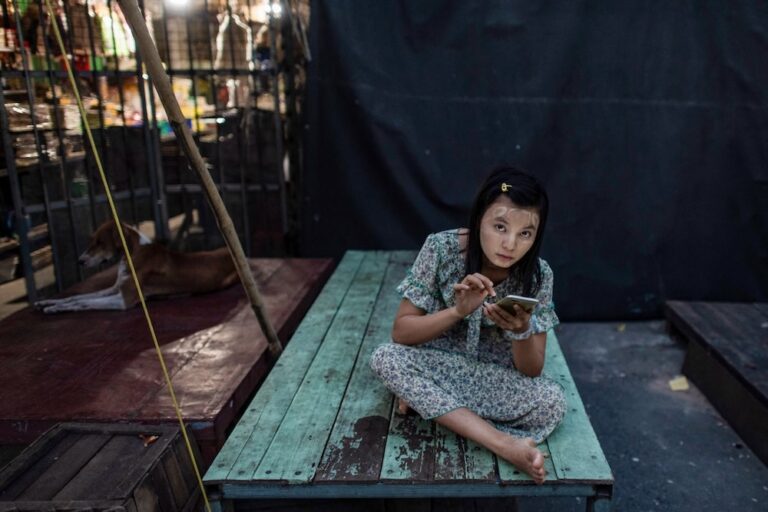(Mizzima/IFEX) – The Burmese military junta has put up another hurdle for Internet users in Burma by blocking the website http://www.blogger.com Following the ‘Saffron Revolution’ in September 2007, the Internet Service Provider (ISP), Myanmar Teleport had restricted surfing to http://www.blogger.com. Soon afterwards, the site was also inaccessible via the other ISP in Burma, Myanmar Post […]
(Mizzima/IFEX) – The Burmese military junta has put up another hurdle for Internet users in Burma by blocking the website http://www.blogger.com
Following the ‘Saffron Revolution’ in September 2007, the Internet Service Provider (ISP), Myanmar Teleport had restricted surfing to http://www.blogger.com. Soon afterwards, the site was also inaccessible via the other ISP in Burma, Myanmar Post and Telecommunication (MPT).
However, a representative from the MPT Kabaaye Pagoda Road office in Rangoon has denied that the ISP was blocking the website.
In a recent interview with Mizzima, she said: “We have not blocked this website, but I don’t know why this website cannot be visited. We haven’t yet received any instruction from Naypyidaw [capital city] in this regard.”
An assistant engineer from MPT’s Naypyidaw office told Mizzima, “Please contact Rangoon MPT office if the website cannot be visited in Rangoon. We haven’t yet received any instruction from the higher authorities. The senior officer who can give you more detail is out of the station now.”
Mizzima consulted an Information Technology (IT) expert who described the access issues. “When we visit http://www.blogger.com an ‘Access Denied’ message pops up on screen in the colour red. Then the message says that the ‘requested website is denied by the network administrator'”, he explained. Though he could not access http://www.blogger.com, the website http://www.blog.com was accessible.
Analysts are saying that the regime blocked the website because news and articles reflecting the situation in Burma were being posted on it. Bloggers inside Burma managed to post updated news with photographs and video footage of the brutal crackdown on protesters in September 2007 so that international viewers could get the news instantly.
An owner of an internet café in Rangoon told Mizzima how the government had instructed them to trace the users and the websites they visited by taking note of their identification and addresses, along with screen shoots from each computer every five minutes.
“They instructed us to take screen shots recently after the news on the hike in license fees for satellite dish antennas was announced. The government instructed us to take screen shots every five minutes and report to them by sending a CD with the data. We never complied with these instructions but some internet café owners who are afraid of reprisals from the authorities might have sent them this information”, he said.
Registering for Internet access in Burma is a costly and bureaucratic affair. To set up an Internet café or Public Access Centre (PAC) and register with one of the country’s two ISPs, MPT and Myanmar Teleport, users must apply to the Ministry of Communication through the body Myanmar Info Tech (MICT).
According to an MICT official, “the applications must be submitted at MICT. Then we forward these applications to the Ministry and must get approval from them before issuing registrations. This process may take seven to ten days.”
The current registration fee for an Internet connection is 500,000 Kyat (approx. US$400), combined with advance payment for six month’s usage at the monthly rate of 50,000 Kyat (approx US$40). Along with other hidden costs, approximately USD$1,300 must be paid annually to MICT for Internet access.
Beyond the high registration costs and monthly fees, terms and conditions for keeping Internet access are hard to comply with. Internet café owners must monitor their clients’ computer usage and report this information to the authorities. The government also sets the fees for Internet usage at the café at 1,000 Kyat (approx. US$0.80) per hour.
Despite the exorbitant fees paid, the service is very poor, a café owner said. “The connection is very poor. The line drops frequently when we download the sound files. MPT did not respond when we tried to lodge a complaint,” a café owner said.
Burmese citizens have also expressed their discontent with the sudden and drastic fee hikes for satellite dish licenses. News of these hikes spread via the Burmese media groups in exile to the outside world. As a result, the regime suspended publication of some media inside Burma for one week and a “Myanmar Times Journal” editor was fired from his job.
“Lack of media freedom is the biggest obstacle and hurdle for us. Our readers expect every magazine and journal to be published on time. They [the junta] should not suspend the publications. This is an obstacle for us,” one Burmese editor told Mizzima.
Despite the junta’s desperate attempts to restrict the flow of information through the media to the people by various means, they have not succeeded in this sophisticated IT age, a technology savvy internet café owner told Mizzima.
“They cannot succeed in banning the websites as there are many ways to bypass the software that blocks access to these sites. The bans are ineffective. And they cannot ban the Internet outright since many pro-junta business tycoons rely on it for their businesses,” he said.


